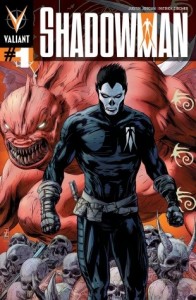 Editor’s Note: My name is Spoiler, for we are many.
Editor’s Note: My name is Spoiler, for we are many.
I’ve said a few times recently that the number of comic titles I was buying back in the early to mid-90s totalled about three or four, with most of them being Vertigo books. There was some reasons for that, one of them being that I was stone broke, and where the rubber hits the road, you can’t go out, drink a comic book and try to get laid.
But the primary reason was that, in the immediate post-Image Comics era, a lot of comics were simply and truly hammered shit. And they were crap for a lot of reasons, but most of them boiled down to the simultaneous rises of the Age of The Artist-Driven Comic, and the Swelling of The Speculator Who Didn’t Give A Shit About Comics Beyond Using Them To Pay For Little Austin’s College Education. So as far as I was concerned, I was seeing a fuckton of books with heavily-stylized covers, new publisher names I’d never heard of, a big ol’ “First Issue! Collector’s Item!” splashed in chromium… and, having read a bunch of these books before tuning out, no story inside whatsoever.
The point is that, when Shadowman debuted back in 1992, I had already begun my early 20s snobbish migration away from stylized superhero comics, and probably turned up my nose at it. Throw on top of that that I didn’t ever have the money for a videogame console until the first XBox came out, it means that I never played the Shadowman videogames by Acclaim, the company that bought Valiant to mine their intellectual properties for games and promptly ran the comics division into the ground. So I have no background whatsoever in the character of Shadowman.
This is kind of a problem when it comes to reading Shadowman #1

 Podcast RSS Feed
Podcast RSS Feed iTunes
iTunes Google Play
Google Play Stitcher
Stitcher TuneIn Radio
TuneIn Radio Android
Android Miro Media Player
Miro Media Player Comics Podcast Network
Comics Podcast Network